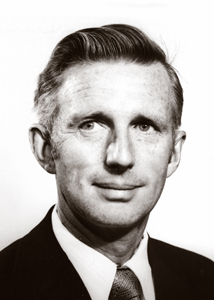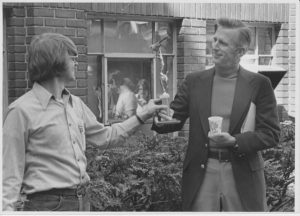
William Ryan Dawson (1927-2020) was a well-known ornithologist and ecophysiologist whose career at the University of Michigan spanned more than 50 years. He served on the faculty of the Department of Biology, including a term as Department Chair (1974-1982), and as the Director of the University of Michigan Museum of Zoology (1982-1993).
Bill was President of the American Society of Zoologists (the precursor to SICB) in 1986. He received a Guggenheim Fellowship (1962), was elected as a Fellow of the American Association for the Advancement of Science (1965), and he was awarded the Loye and Alden Miller Research Award from the Cooper Ornithological Society (1996) for his lifetime of work in ornithological research. He supervised 19 doctoral students, one of whom (Richard Marsh) writes of Bill fondly below.
Robert Payne wrote an In Memoriam for Bill for The Auk, which is excerpted here.
Recollections from Richard Marsh
First, some serious reflections on Bill’s influence on my time at the Michigan Biological Station. I was teaching high school at the time in between my undergraduate degree and going to graduate school. Ironically, I ended up in his course because the terrestrial ecology class I tried to enroll in was full. His approach to biology changed my interests from straight ecology to a physiological approach to animal adaptation, and led me to apply to work with him at the University of Michigan. Bill was a demanding advisor. His dedication to quality science could be intimidating to some, but definitely kept you trying your best. When I ventured into speculation during one seminar, he reminded me that I was, “skating on the thin ice of my knowledge,” and he was correct to do so. His dedication to producing quality data was impressive. He advised his students that “instruments will lie to you every chance they get,” and “an instrument that cannot be calibrated is worthless.” He pushed all of his students, including me, to be independent scientists, and never took credit for the work we pursued on our own.
One aspect of Bill’s personality that you may hear from others is that he was famed for his sense of humor, which could be acerbic at times. Perhaps, one example will suffice. I attended a symposium on environmental physiology at the Michigan Biological Station during my graduate school days. In attendance were a number of scientists whose work was mostly lab based. However, because the theme of the conference related to organisms coping with the environment, the first speaker went out of their way to try to illustrate how they had done some field work. This led the following speakers to bend over backwards to do the same. When it was Bill’s turn to talk, he started out by saying that he was equally dedicated to field biology. So much so, that he always tried to keep the windows open in his laboratory when he was collecting metabolic data.

